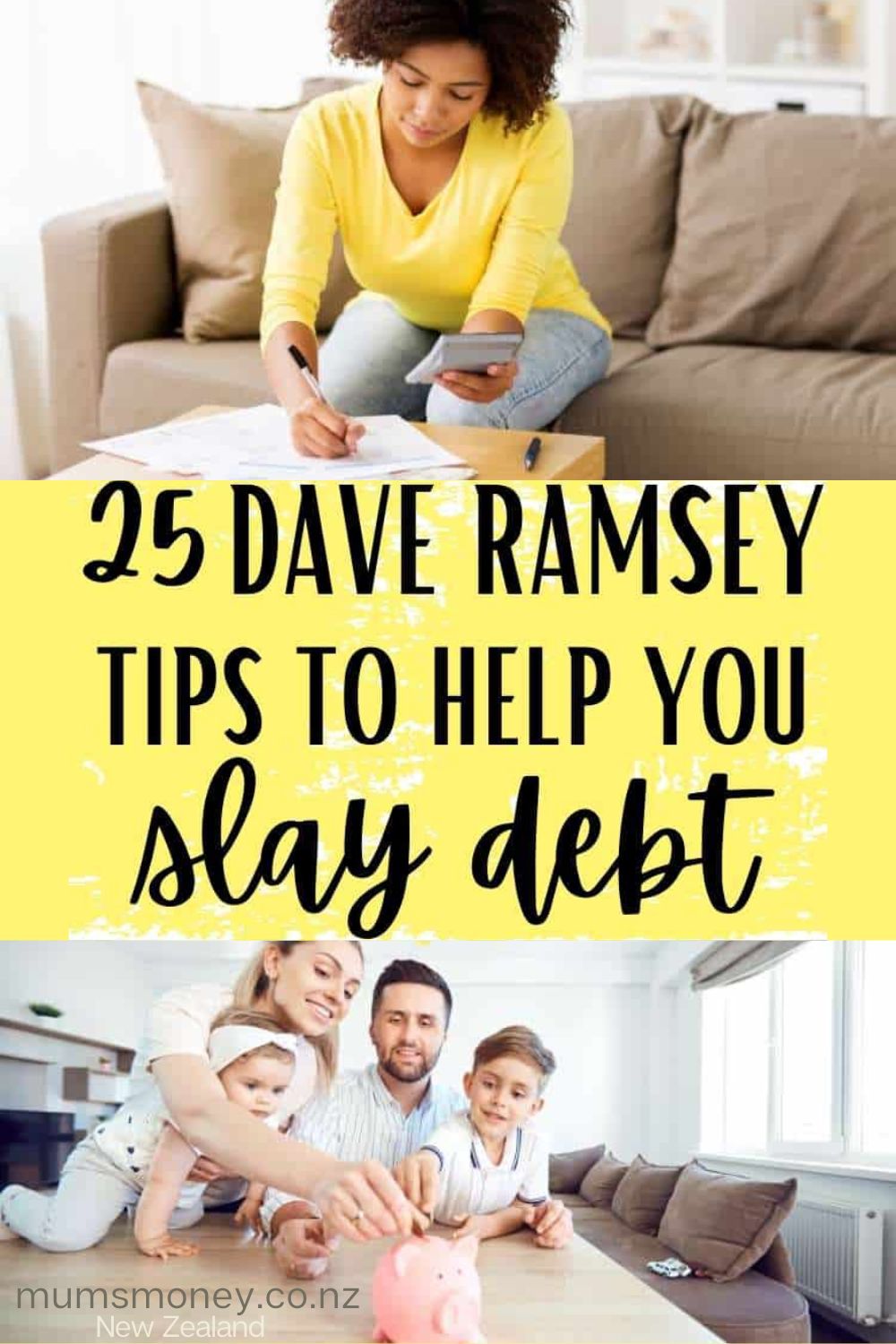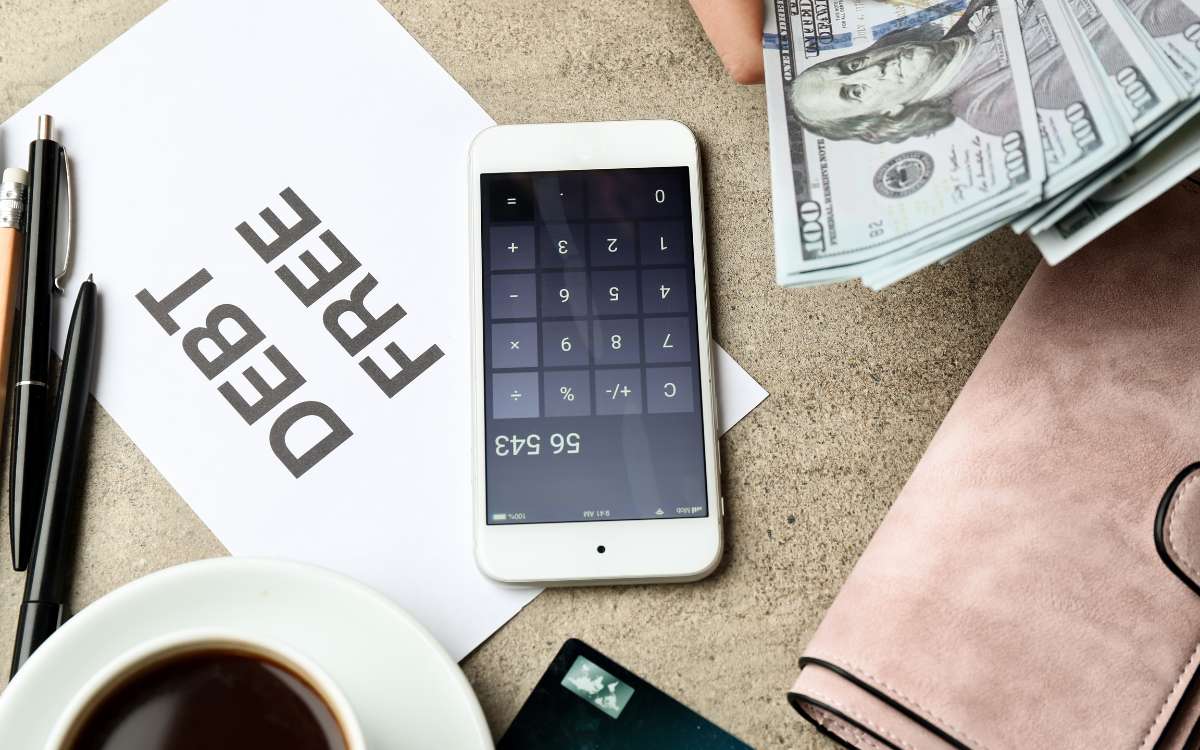
Inside: These are the best Dave Ramsey tips that will improve how you use money and help you get out of debt.
If you are struggling to get out of debt or you want to find a way to have more money at the end of your month, listening to the teachings of Dave Ramsey can transform your life.
Even if you have never heard of Dave Ramsey, this guide will tell you everything you need to know – about him, his lessons, and his best tips.
Table of Contents
- Who Is Dave Ramsey?
- Dave Ramsey’s Most Popular Products
- How Dave Ramsey’s Teaching Improved People’s Lives
- What Does Dave Ramsey Teach?
- Dave Ramsey’s Baby Steps
- Best Dave Ramsey Tips That Will Transform Your Life
- 1. Budget To Zero Before The Month Begins
- 2. Don’t Buy Cars Brand New
- 3. Use the Cash Envelope Method
- 4. Be On The Same Page As Your Spouse
- 5. Find the Courage To Change
- 6. Be Gazelle Intense
- 7. Assess Your Spending
- 8. Act Your Wage
- 9. Every Month Is Different
- 10. Start With the Most Important Categories First
- 11. You Don’t Need A Credit Score
- 12. Live Like No One Else
- 13. Side Hustle
- 14. Set Up Sinking Funds
- 15. Get Life Insurance
- 16. Invest Wisely
- 17. Actively Meal Plan
- 18. Celebrate Your Milestones
- Final Thoughts
Who Is Dave Ramsey?
Dave Ramsey is author, radio host, personal finance expert, and teacher. His success is pretty impressive.
His seven best-selling books have sold a combined 11 million copies!
What sets him apart is his riches-to-rags and back-to-riches story. He teaches from experience.
By age 26, he amassed a $4 million real estate portfolio, only to lose all of it due to poor money management by the age of 30.
Then, he rebuilt his life and began to share the wisdom he gained in books to help others rebuild their financial lives, too.
Basically, this guy knows his stuff because he built wealth from nothing.
If anyone can help people who need it, it’s Dave Ramsey.
His financial teachings became super popular because they are written in plain English.
He lays everything out in baby steps that anyone can do.
But he also challenges people too. His methods might hurt a little in the short term, but they pay off down the road.
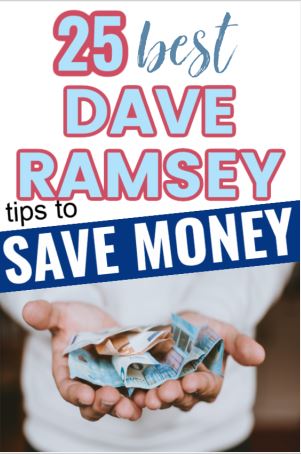
Dave Ramsey’s Most Popular Products
Not only does he have a radio show, but Dave Ramsey also published many best-selling books and even some classes.
In fact, his online store is packed with a huge variety of personal finance products.
There are still a few things for which he’s the most well-known.
- Total Money Makeover – This is his best-selling book to date. In it, he lays out each step for revamping how you manage your money and includes his best tips.
- Financial Peace University – This is a course you can take. In it, you’ll learn the basics of money management and work together with your family or friends to set up a budget.
- Dave Ramsey Show – Dave Ramsey is a popular radio show host. On the Dave Ramsey show, people will call in with questions, and he will celebrate with people as they announce they are debt-free!
- Ramsey+ – He also offers a membership to a suite of products. This annual membership fee includes access to all of his online courses (including Financial Peace University), the EveryDollar budget app, and tracking your progress with the Baby Steps app.
How Dave Ramsey’s Teaching Improved People’s Lives
I get it. Why should you care about something a radio host and author has to say?
The thing is, his teachings are so revolutionary that they actually work!
I can personally tell you that following his tips helped me budget my money and stop overspending.
People following Dave Ramsey’s rules claim that it helped them spend less, get out of debt, invest more, and prepare for the future.
His methods are pretty simple. You have nothing to lose!
Scan this guide and pick out the pieces that make the most sense.
You might discover that they work for you just like they have worked for millions of others.
What Does Dave Ramsey Teach?
The financial guru Dave believes everyone should keep more of their money.
This means getting and staying out of debt and investing wisely.
His views against debt are pretty shocking. Lots of people build their lives according to their credit score.
Ramsey believes you don’t even need a credit score!
Keep reading and discover 18 money tips from Dave Ramsey that will help you manage your money.
You’ll finally be able to be in total control of your finances instead of letting your money control you!
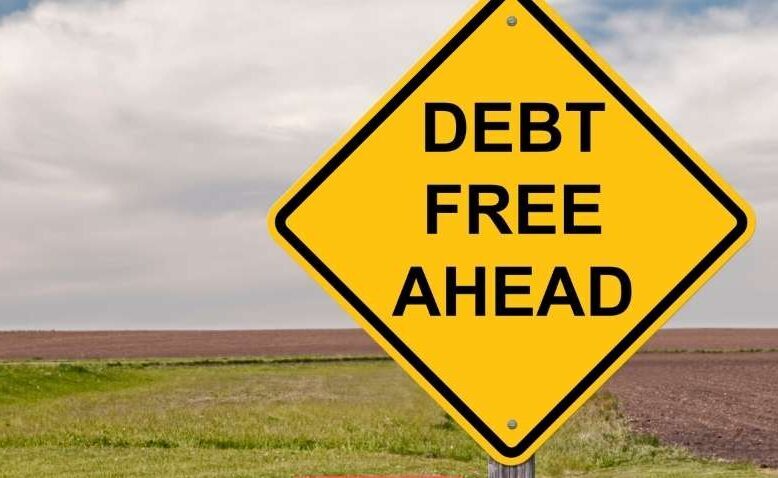
Dave Ramsey’s Baby Steps
Before we get into the Dave Ramsey financial tips, starting with the baby steps is important.
These are the seven things everyone should start doing as soon as possible.
All of Dave’s views about money can be summed up in these baby steps.
The Dave Ramsey baby steps are:
- Save $1,000 Emergency Fund
- Pay off consumer debt
- Save 3-6 months of expenses
- Invest 15% in retirement
- Save for kids’ college
- Pay off your mortgage early
- Give generously
1. Start An Emergency Fund
Before you do anything else, the first step is to save $1,000 in a small emergency fund.
This is super important. As you start paying off debt, you will live on a very tight budget.
You need this emergency fund around to pay for anything “surprising” that happens to you.
This emergency fund will pay for things like if your car breaks down or a surprise medical bill.
This way, when life happens, it won’t derail you from what you are working so hard at.
I have many tips to help you learn about setting up an emergency fund.
2. Pay Off All Consumer Debt With Debt Snowball
After setting up an emergency fund, focus completely on paying off your consumer debt. This includes major credit cards, hire purchases, buy now, pay later, etc.
Dave Ramsey teaches people to use his debt snowball method to accomplish this.
I used the debt snowball method, and now I live free of all consumer debt.
I can tell you that this method does work.
Here’s how to set up and do the debt snowball.
- Make a list of your debt, with the smallest amount on the top.
- Pay off the smallest debt first. Try hard to pay it off as fast as you can.
- “Snowball” or apply the amount you previously applied to this first debt to the next-highest debt amount.
- Use the added payment amounts from the previous small debt to pay off the next larger debt as quickly as possible.
- After this debt is paid off, use the full amount you were paying and apply it towards the next largest debt.
Keep this pattern going until all of your consumer debt is completely paid off.
It might take a while, but it will be worth it! Imagine how much money you will have when all of your retail debt is completely paid off.
3. Save 3-6 Months Of Expenses
After you pay off your retail debt, create a larger emergency fund. Take all that extra money that you will have now that you don’t have to pay debt payments and put it all into savings.
This will take a little bit of work. You’ll have to go back through the last 2-3 months and calculate how much you spend on monthly expenses.
Since each month brings with it different expenses, it’s ok to “round up” and estimate how much you spend on expenses.
Then, multiply this monthly amount by 6. This is how much you will need to put into savings.
Saving 3-6 months’ worth of expenses is very important because it’s a safety net.
This way, if you lose your job or get hurt and can’t work, you have enough money to last you enough time to bring in more income.
4. Invest In Retirement
Next, you need to focus on investing your money wisely for retirement. It might feel familiar because it is a lot like the “pay yourself first” principle that other financial gurus teach.
Your goal should be to invest 15% of your income towards retirement. Start by putting more into your KiwiSaver in New Zealand (or Super in Australia, 401(k) in the US ) and max out any employer contribution matches that you can.
Alternatively, a workplace super scheme might offer an alternative.
Then, get advice on the best method for investing the remainder. An index fund with low fees is probably your best bet.
Try to invest your money as soon as you can. Even if you can’t afford the entire 15%, invest as much as you can – it really does grow over time.
Editor’s note: As a self-employed person, I invest most of my money outside of Kiwisaver, BUT I ensure I always invest enough (currently $1042 per year) to get the full government match. Why wouldn’t you? It’s free money!
5. Save For Your Children’s Education
Another part of the baby steps is to set up your children for success as an adult.
This means helping them avoid student loan debt. Dave Ramsey teaches college planning frequently.
The best way to do this is to start investing in an Education Savings Account (ESA).
This works just like a Roth RIA – your savings will accrue tax-free. There is a limit of $2,000 per year per child.
If you start when your child is a baby and save up the max of $2,000 per year, you could have $36,000 in the account when they turn 18. It’s a fantastic idea!
If you want to invest more than $2,000 a year, then he suggests investing in a 529 plan. It also grows tax-free.
Dave Ramsey warns that you should avoid pre-paid tuition plans and anything with fixed investment options.
You’ll know you found a good 529 plan when it lets you control which funds to invest in and how much you can invest in each type.
Note: This only works in the United States, as New Zealand doesn’t have education savings products. We personally invest for our children in an index fund, and when it comes time, they will be able to use those funds as a house deposit or to pay for further studies if they choose to do so.
6. Pay Off Your Mortgage Early
Another common teaching from Dave Ramsey is paying off your mortgage early.
This is often the biggest debt that most people have.
When you hear people shouting on his radio show, “We are debt-free!”
They reached the hard-fought goal of paying off their mortgage, too. It really is possible!
When you pay off your mortgage early, you can keep more of your money in your pocket.
Imagine how much more income you could have if you didn’t have to pay your mortgage. It’s worth the effort!
7. Give Generously
Finally, Dave Ramsey always encourages people to donate to charities and give generously. In fact, one of my favourite quotes from him about this is:
“When you give generously, you learn that financial security doesn’t come from acquiring dollars and things. True financial peace is about the freedom to live and give like no one else.”
According to Dave Ramsey, your goal should be both living like no one else and giving like no one else.
He is always telling people to be generous, don’t hoard your wealth.
Giving back gives us so much peace and joy – it’s a fabulous goal that will make your life better.
Best Dave Ramsey Tips That Will Transform Your Life
Now that you know who Dave Ramsey is and have a pretty good idea about what he teaches, let’s look at some of the most life-changing bits of advice he has taught through the years.
These tips are basically a summary of the best parts of what he teaches.
While nothing will completely revamp your finances quite, like reading his books or taking a class directly from him, I hope this mini-guide will help set you on your way!
1. Budget To Zero Before The Month Begins
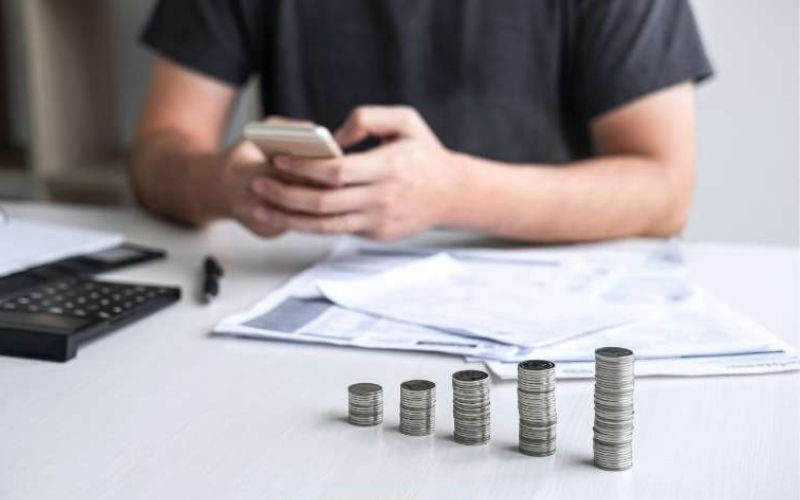
If you are going to manage your money, you will need to set up a budget.
There are so many benefits of budgeting – from finally controlling your money to being able to talk about it with your spouse.
Dave Ramsey is constantly teaching people to set up a zero-sum budget.
Another way to say this is to budget to zero.
What this means is you plan out every cent. When you subtract your expenses and savings from your income, you should get zero.
Read this guide to learn how to set up a zero sum budget.
It’s important to set this up before the month begins so that you can control impulse spending and plan ahead for any larger expenses that are happening that month.
If you calculate your budget and realise you are in the negative, don’t let it derail you.
Use this as an opportunity to motivate you to earn more money or try to find ways you can cut back.
2. Don’t Buy Cars Brand New
Another very common teaching from Dave Ramsey is that buying a new car is a horrible financial decision everyone should avoid.
Here’s why: as soon as you drive off the lot, your investment in that vehicle depreciates.
That means it loses value the instant you drive it.
The math backs this up. If the average new car depreciates by 18% in the first year, doesn’t buying a 1-year-old car for 18% off the new car price make more sense? I think so!
When you make car payments, you will be paying interest, and you will pay way more than the car was ever worth. Yikes!
Instead, figure out the car you want and calculate how much the payments for it will be.
Then, set aside that amount each month. When you are ready to buy that new car, pay cash with the amount you saved up!
There is no shame in always buying used cars. It’s actually smarter to do it this way.
3. Use the Cash Envelope Method
Dave Ramsey also teaches people to pay with cash as much as possible.
Studies back this up. When people use cash instead of swiping a card, they spend an average of 15-20% less.
Cash envelopes are an easy way to separate how you will spend your monthly cash.
The most popular ways that people use cash envelopes are for budget categories like entertainment, gas, groceries and other categories where you are known to overspend.
4. Be On The Same Page As Your Spouse
This Dave Ramsey money tip is something that he teaches very frequently.
If you are married, you must be on the same financial page.
It is almost impossible to try and accomplish specific financial goals alone.
A lot of Dave’s teachings require lots of self-discipline and planning.
If you do this with your spouse, you can support and encourage each other when things get stressful.
5. Find the Courage To Change
Lots of Dave Ramsey’s teachings can be slightly painful. Spending more money than you make and rely on credit is much easier and more fun.
It takes saying “no” to many things you want to get out of debt – which isn’t easy! It takes courage.
This is another reason that having a support system around you is so important.
You need the strength to make financial decisions that will pay off in the long run.
6. Be Gazelle Intense

If you follow Dave Ramsey’s ideas, you’ll come across this phrase.
He came up with this quote after reading this verse from the Bible:
“Give no sleep to your eyes, nor slumber to your eyelids. Deliver yourself like a gazelle from the hand of the hunter, and like a bird from the hand of the fowler.”
Proverbs 6:4-5
In other words, the way to get out of debt is to run away from it as fast and as intense as a gazelle runs away from a cheetah.
Work as hard at getting out of debt as if you are about to be eaten by the hunter.
When you do this with this kind of intensity, you can break away from all the temptations that will pull at you to make you fail.
7. Assess Your Spending
Another of Dave Ramsey’s money tips is to constantly assess your spending. It might even be a good idea to do this once a month.
You need to know where your money is going and whether it is working for you as well as it should be.
You can do this at the end of the month or even every other week.
If you use the cash envelope method, look at how much you have left and try to decide if you are spending your money wisely.
Look at how much you put in savings and see if you can increase it.
Constantly assess how you spend your money so that you don’t become apathetic and begin overspending again.
8. Act Your Wage
Something else he says is that you should “act your wage!”
This Dave Ramsey method involves the basic concept of living within your means.
Buy a modest home you can afford. If you can’t pay for a brand-new car with cash, don’t go into debt to look like you can.
When you free yourself from trying to “keep up with the Joneses”, you will discover contentment. You’ll actually be happier and have less stress.
Live frugally, and always get the most bang for your buck.
Ask for free samples from companies before you commit to changing brands of items you use regularly.
This mindset will help you build long-term wealth that will pay off in the long run.
9. Every Month Is Different
The Dave Ramsey budgeting tip that helps so many people is remembering that each month is different.
You can’t just set a budget in January and expect it to work all year long.
The electricity bill, travel needs, and gift amounts change (hello, Christmas!).
Remember, each month is new, so you should review your budget every month and ensure it accurately allocates your money where it needs to go.
10. Start With the Most Important Categories First
When you set up a budget, start with the most important categories first. The most important ones of all are giving and saving.
After you budget those, plan for what Dave calls the “Four Walls” – food, shelter, utilities, basic clothes, transportation.
Then, use the money that is left over to pay for the other things.
Keep your priorities straight, and you’ll be less likely to overspend each month.
11. You Don’t Need A Credit Score
He also teaches that it’s possible to live without a credit score.
The biggest reason that people think they need a credit score is to buy a house.
But did you know buying a house without a credit score is possible?
You’ll need to have a really large deposit saved up first.
You’ll also need an outstanding history of rental and utility payments.
Then, use a mortgage company that uses “manual underwriting” or no-credit score lending. It’s possible and does happen!
Think about it, if you always pay cash, you never need a credit score.
Don’t get caught in a loop. The only way to get a credit score is to borrow money so that you can borrow more money later.
It’s an unending loop that is set up to keep you in debt.
Editors Note: In New Zealand, you don’t need to get into debt to get a credit score. According to Consumer Protection, the following are ways to improve your credit score.
- Always pay loans and bills on time to avoid negative impacts on your credit score.
- Pay off your credit card balance in full each month to build a positive credit history.
- Regularly review your credit reports from all three credit reporting agencies for accuracy and dispute any errors you find.
- Avoid sharing bills with others, as their non-payment could harm your credit score.
- Be cautious with the number of credit applications you submit because each one can slightly lower your credit score.
- Steer clear of payday loans and similar quick finance options, which can indicate poor financial management to potential lenders.
- Cancel any credit cards or accounts you do not use to prevent them from negatively affecting your credit profile.
- Consider the timing of credit applications since negative items on your credit report can remain for four to five years before they are removed.
12. Live Like No One Else
Another phrase he coined is, “If you live like no one else now, you will be able to live like no one else later.”
This means to forget about the Joneses.
Let’s face it. Always driving a used car, paying with cash, and not having a credit card is kind of weird.
Doesn’t everyone have a little bit of debt? Perhaps.
But you don’t want to be like everyone because most people also don’t have a solid retirement plan either!
13. Side Hustle
If you figure out your budget and you can’t find any way to pay it off, maybe you need to earn more money.
Side hustles are ways that you can bring in extra money when you need it the most.
Here are some ways to increase your income – some are easier than others:
- Work overtime
- Teach English online
- Ask for a raise
- Do freelance work
- Get a Second Job
- Take Paid Surveys
- Start a Side Hustle
- Start A Money-Making Blog or Niche Site
- Earn Passive Income
- Use Cashback Apps
- Sell things on Etsy
- Sell Clothes and Items Around Your Home
- Sell pictures of your feet (seriously, it’s a thing)
Find the ones that work for you.
If you are a strong writer, you may be a freelance writer.
If you have a dependable car, drive for Uber or deliver food for DoorDash.
You can do these things in your free time to bring in more money.
14. Set Up Sinking Funds
A sinking fund is money you save each month to go toward replacing something – car repairs, house repairs, or appliances.
This is another one of my favourite Dave Ramsey budget tips.
For example, let’s say you know that your roof will need to be replaced in the next 2-3 years.
If a new roof costs $3,000, then you should put that much into savings and label it a “roof sinking fund.”
That way, when it comes time to replace the roof, you won’t have to go into debt to do it.
15. Get Life Insurance
Dave Ramsey is a huge fan of term life insurance. Term life insurance is coverage that is for a specific amount of time.
If you or your spouse passes away during this time (usually 20-30 years), your beneficiaries will receive a payout.
This is better than whole life insurance (which covers you for your entire life) because it is so much more affordable.
This is because term life insurance is worth nothing unless you or your spouse dies.
You can’t cash it out early – unlike whole life insurance.
16. Invest Wisely
Another part of Dave Ramsey’s teachings is to invest your money wisely and prepare for retirement.
The easiest way to invest your money is through your retirement funds like KiwiSaver or Australian Super.
You should talk to an investment professional you trust.
17. Actively Meal Plan
Another really fantastic way to control how much you spend at the grocery store is to pre-plan meals for the week.
This Ramsey money tip goes perfectly with the cash envelope method.
Plan out all the meals for the upcoming week. Some people go the extra mile and plan out meals for the entire month.
Do what works for you and your family.
Related: Eating Well on a Budget with The Great Little Cookbook
18. Celebrate Your Milestones
All this hard work deserves to be celebrated! That’s one of the best parts of his radio show.
He literally celebrates with people when they become debt-free!
Celebrate every single milestone that you reach. Every time you pay off a debt, have a small party!
You deserve to feel the freedom and excitement that reaching your goals brings!
Final Thoughts
When you actually start using tips from Dave Ramsey, you might be surprised at how much it challenges how you’ve thought about money.
Trust me, in the end, it is worth it! After going through the growing pains, you’ll keep more of your own money and feel richer. It just takes a little work to get there.
Related:
- 23 Money-Saving Tips Every Kiwi Needs to Know
- We Paid Off Our Home in Five Years. I Blame Minimalism.
